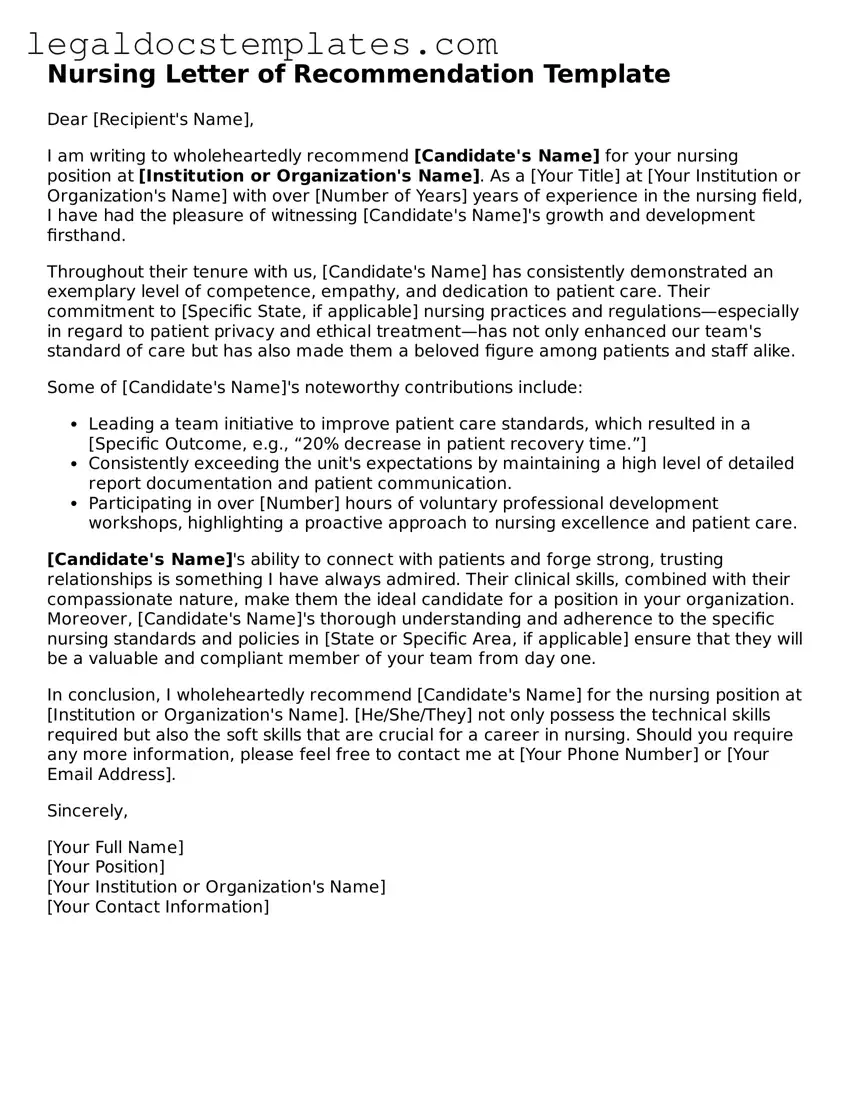The Nursing Letter of Recommendation form shares similarities with the Medical School Letter of Recommendation. Both documents are pivotal in the landscape of academic and professional advancements in healthcare, serving as endorsements for candidates seeking to enter or progress within medical fields. The content typically outlines the applicant's competencies, experiences, and attributes that are deemed essential for successful performance in their targeted roles. The effectiveness of both letters depends significantly on the specific insights and examples provided by the recommender, which help distinguish the candidate in a competitive pool.
Equally, the Employment Reference Letter mirrors the Nursing Letter of Recommendation form in its fundamental purpose: to provide a thorough assessment of an individual's capabilities and performance. However, while the former can be applied across various industries, the latter is specifically tailored to the nursing profession. Both documents contribute crucially to decision-making processes, whether for hiring, promotions, or professional development opportunities, by highlighting the individual’s achievements and potential for future success.
Similarly, the Professional License Application Reference Letter aligns with the Nursing Letter of Recommendation in supporting individuals to obtain or advance in professional licensure. These documents must underline the applicant's ethical standing, expertise, and dedication in their field. Essential for those in regulated professions, including nursing, these letters often include detailed examples of professional conduct and contributions to the field, underpinning the candidate's qualifications for licensure.
The Academic Scholarship Application Letter of Recommendation shares a common goal with the Nursing Letter of Recommendation: to secure opportunities for personal and professional growth. While the former primarily addresses scholastic aptitude and potential for academic success, the nursing letter focuses on clinical skills, compassion, and patient care excellence. Both, however, are crucial in persuading review committees of the candidate’s merit and suitability for the scholarship or program in question.
The Residency Application Letter of Recommendation is another document closely related to the Nursing Letter of Recommendation, especially when the candidate seeks a position within a medical or clinical setting. This type of recommendation is crucial in the residency selection process, offering insights into the candidate's clinical abilities, professionalism, and suitability for the healthcare team. Although targeted at different stages of professional development, both letters aim to advance the candidate's career within the healthcare system.
The Fellowship Application Letter of Recommendation is akin to the Nursing Letter of Recommendation, as both serve to endorse candidates for highly competitive positions requiring specialized skills and knowledge. These letters need to convincingly argue the candidate's readiness to contribute to and grow within a specific academic or clinical area, emphasizing attributes such as leadership, research capabilities, and clinical expertise. Each letter plays a pivotal role in the candidate’s professional journey, providing a gateway to advanced training and career development opportunities.
Character Reference Letters, while not exclusive to the healthcare industry, also resemble the Nursing Letter of Recommendation in structure and intent. Such letters vouch for the character and values of the individual, which are indispensable qualities in nursing. They present personal insights into the individual's integrity, empathy, and team spirit—traits that are as critical as professional competencies in nursing and are thus highly valued in both contexts.
The Volunteer Position Letter of Recommendation bears resemblance to the Nursing Letter of Recommendation in its emphasis on personal traits and professional skills. While focusing on the candidate’s voluntary contributions, such letters highlight dedication, altruism, and the ability to work well under pressure—qualities that are integral to both volunteering and nursing careers. This type of recommendation underscores the individual's commitment to service, a core principle in nursing.

